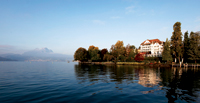
WITH its healthy climate, fresh air, mountains and lakes, the Alpine country of Switzerland is an attractive package when it comes to wellness and medical tourism and recent figures indicate it’s only going to get more popular.
There are a variety of reasons why a Middle East traveller would visit Switzerland for wellness and medical reasons. There are a variety of private hospitals, spas, wellness centres and clinics and with an emphasis on quality in an environment that lends itself to general wellbeing, the Middle East traveller will have plenty of options across cities such as Geneva, Lausanne and Lucerne.
“About 5-10 per cent of the wellness business is covered by people from the Middle East,” reports managing director Gregor Frei of Swiss Health. “During the last three years an annual increase of about 20 to 50 per cent (mainly from the GCC countries) has been reported. Hence, Middle Eastern guests and patients are becoming more and more important for Switzerland.”
The biggest hospital in Switzerland is Hôpitaux Universitaires de Genève (HUG), a non-profit organisation which is also a teaching hospital. Attracting some of the top medical professionals from around the world, the hospital also offers patients a private clinic, attracting patients from countries such as the Kingdom of Saudi Arabia, United Arab Emirates, and Qatar. Alain Fong, VIP Representative for the clinic succinctly explains why their offering attracts overseas customers:
“When you choose to come to Switzerland, it’s not for economic reasons, it’s for the quality.”
With 65 different medical services available, coupled with arrangement of transfers (including the option of private planes), Arabic speaking staff and translators, and connecting rooms, it’s perhaps not surprising that the private clinic is 60 per cent full all year round.
Other hospitals in Geneva include Clinique Générale-Beaulieu, a private hospital which has also seen requests from the Middle Eastern market, making up approximately 5- 10 per cent of their patient intake.
Further afield, just 40 minutes away by train is Lausanne, a city dating back to the Roman times. In addition to its variety of shops and markets and the historical ‘Old Town’, the city has a several medical and wellness offerings including Hirslanden Lausanne which runs two medical centres, Clinique Bois-Cerf and Clinique Cecil. The Hirslanden Group has 14 clinics across Switzerland and has built its reputation on a medical offering, as opposed to wellness. With a dedicated representative for international patients, the clinics offer private rooms and nursing, personalised service, translators and interpreters and a limousine service. Check-ups are highly sought over and start from CHF10,000 ($10,576). While the clinics don’t actively market themselves, word-of-mouth referrals generate the majority of business.
 |
|
The Park Weggis provides its guests a wide range of wellness treatments while guests enjoy a peaceful and stress-free stay. |
For travellers looking for more aesthetic options, Clinic Lémanic, also in Lausanne, offers services in the areas of dermatology, aesthetic medicine and anti-aging. Founded in 1998, the clinic is dedicated to skin health and beauty.
“Today, people tend to be looking for non-invasive methods, aiming to look healthy, rather than going under the knife.”
The fact that Clinic Lémanic’s website is in Chinese and Russian perhaps alludes to their customer base, however it is becoming more popular with Middle Eastern travellers, especially in regard to issues such as skin pigmentation.
For 2013, Lausanne Tourism Board’s strategy for the Middle East region is to focus on PR, having already tied up with an Abu Dhabi based agency. Tamja Dubas, director of sales and marketing explains: “We strongly believe that media visits to Lausanne and the region help us in promoting the wellness and medical market. Lausanne Tourism is also not the only one promoting to the Middle Eastern market – the presence of five star hotels, organisations such as Swiss Health and private clinics such as Clinique Montchoisi and others do a great job of promoting the wellness and health care offering in our city.”
To support hotels such as Park Weggis, Lucerne Health (part of Swiss Health) was established in February 2011, to promote the various wellness and medical offerings in Lucerne. While it’s still very early days, the number of guests received through Lucerne Health has already increased by 45 per cent between 2011 and 2012 to date. Wanqiu Frey, business development manager, explains their future strategy: “We are looking for distributors in different countries in the Middle East and we also plan to share market events with our partners such as Lucerne Tourism, Swiss Health and the Swiss Tourism Board. We are expecting to have one agency in each key country in order to drive more awareness.”
For many travel professionals, the question remains as to what extent Switzerland can cater to the demands of the Middle Eastern wellness and medical market. According to Frei, the answer is reasonably well.
If Swiss Health is to achieve their target of increasing guests and patients by 50 per cent in the next two years, such adaptation may be necessary in order to capture and increase business from the region and it’s very much part of Frey’s plan.
By Karen Osman
